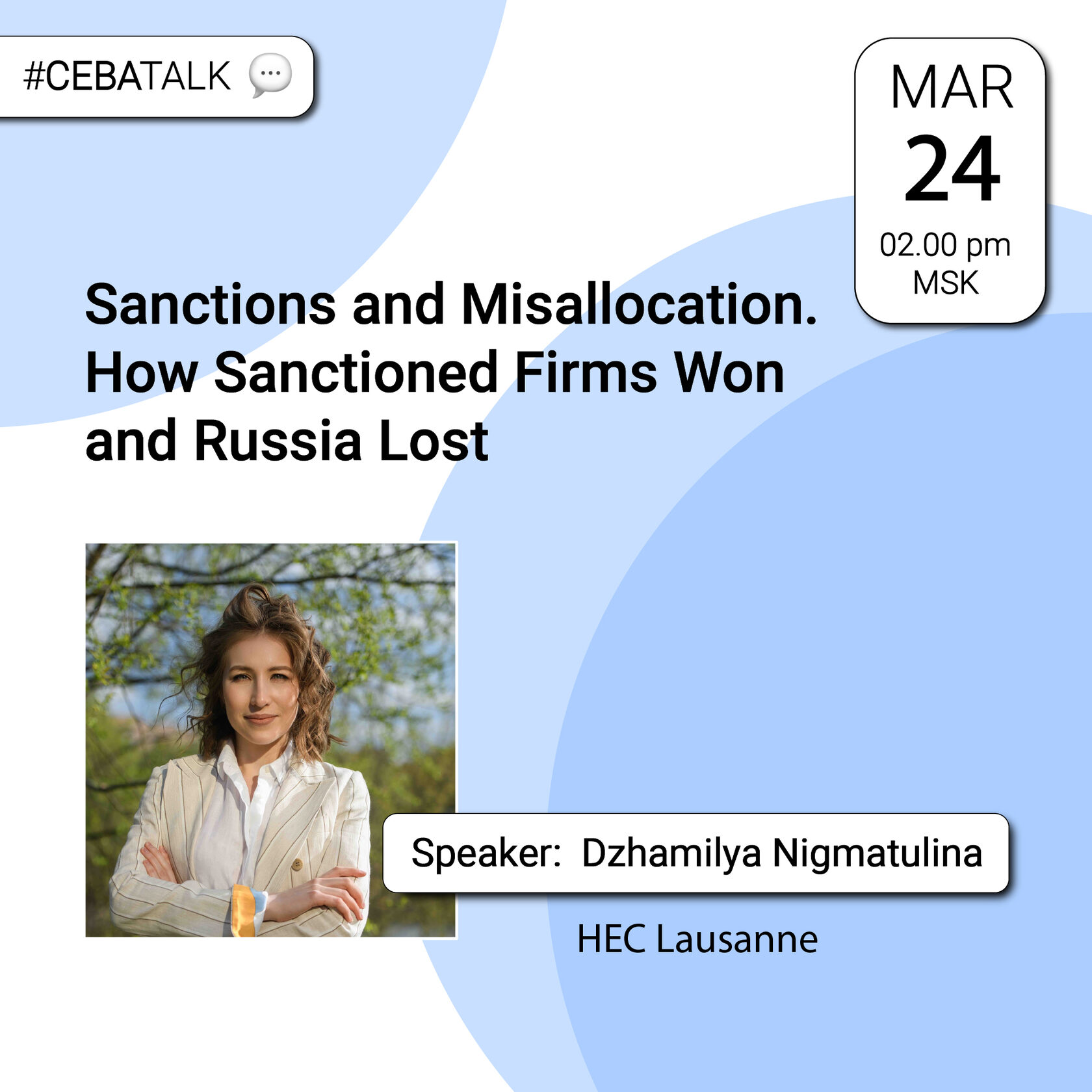Time: 24 March (Friday) 14.00 Moscow time
Speaker: Dzhamilya Nigmatulina (HEC Lausanne)
Title: Sanctions and Misallocation. How Sanctioned Firms Won and Russia Lost.
Field of study
"My research is in Macroeconomics and Development. The means I use neutral experiments to causally estimate policies affecting specific firms and households, and macro models to calculate the effect of these policies on the aggregate."
What problem is your research intended to solve?
"The research tries to calculate the effect of 2014-2020 sanctions against Russian firms on the aggregate economy."
What did your research find?
"My findings show that sanctions hit specific firms, but were followed by subsidies and government contracts that made these firms do better than in the absence of sanctions. The sanctioned firms were already inefficiently large before sanctions, and the event of sanctions+protection made the inefficiency worse. On the net, the Russian economy lost at least 0.33% of GDP because of over-protection of targeted firms after sanctions."
Abstract: Using a unique natural experiment of staggered firm-level sanctions against Russia in 2014-2020 and the data on over 600,000 Russian firms, I estimate the effect of sanctions on targeted firms and on the aggregate economy. Surprisingly, sanctioned firms on average gained 38% more capital inputs after sanctions relative to the industry trends. The effect is in part driven by sanctioned state-owned firms, getting 60% more capital relative to non-sanctioned firms. Using additional data on subsidies and government contracts, I find that this result is explained by the government protection of targeted firms, that more than compensated for a negative sanctions shock. However, the sanctioned firms were already too large and had too much capital prior to sanctions. I use a heterogeneous firm framework to show that the distortions between sanctioned and non-sanctioned firms, which existed before the sanctions, got exacerbated after the joint effect of sanctions and government protection. I combine the causal estimates with the quantitative framework and estimate that on the aggregate, the Russian TFP dropped at least by 0.33% reaching 3% in relevant sectors.
More information, a link to the research and the upcoming seminar here.
We are looking forward to seeing you!
Speaker: Dzhamilya Nigmatulina (HEC Lausanne)
Title: Sanctions and Misallocation. How Sanctioned Firms Won and Russia Lost.
Field of study
"My research is in Macroeconomics and Development. The means I use neutral experiments to causally estimate policies affecting specific firms and households, and macro models to calculate the effect of these policies on the aggregate."
What problem is your research intended to solve?
"The research tries to calculate the effect of 2014-2020 sanctions against Russian firms on the aggregate economy."
What did your research find?
"My findings show that sanctions hit specific firms, but were followed by subsidies and government contracts that made these firms do better than in the absence of sanctions. The sanctioned firms were already inefficiently large before sanctions, and the event of sanctions+protection made the inefficiency worse. On the net, the Russian economy lost at least 0.33% of GDP because of over-protection of targeted firms after sanctions."
Abstract: Using a unique natural experiment of staggered firm-level sanctions against Russia in 2014-2020 and the data on over 600,000 Russian firms, I estimate the effect of sanctions on targeted firms and on the aggregate economy. Surprisingly, sanctioned firms on average gained 38% more capital inputs after sanctions relative to the industry trends. The effect is in part driven by sanctioned state-owned firms, getting 60% more capital relative to non-sanctioned firms. Using additional data on subsidies and government contracts, I find that this result is explained by the government protection of targeted firms, that more than compensated for a negative sanctions shock. However, the sanctioned firms were already too large and had too much capital prior to sanctions. I use a heterogeneous firm framework to show that the distortions between sanctioned and non-sanctioned firms, which existed before the sanctions, got exacerbated after the joint effect of sanctions and government protection. I combine the causal estimates with the quantitative framework and estimate that on the aggregate, the Russian TFP dropped at least by 0.33% reaching 3% in relevant sectors.
More information, a link to the research and the upcoming seminar here.
We are looking forward to seeing you!
